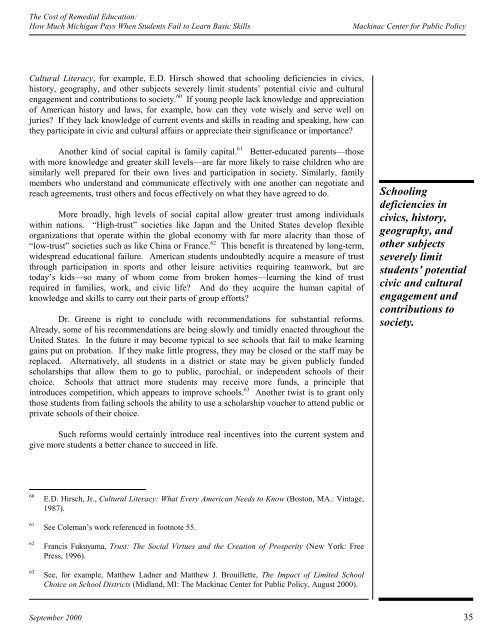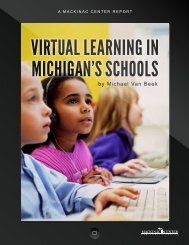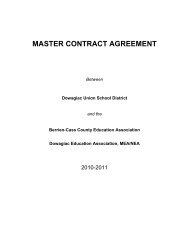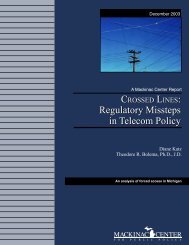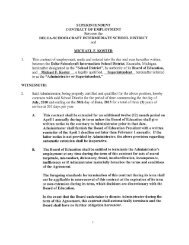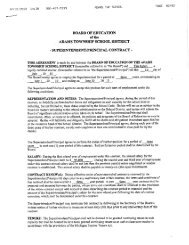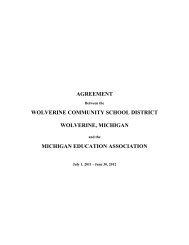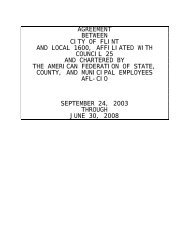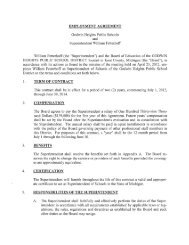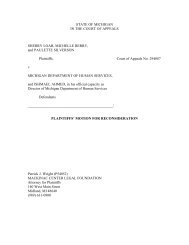The Cost of Remedial Education - Mackinac Center
The Cost of Remedial Education - Mackinac Center
The Cost of Remedial Education - Mackinac Center
You also want an ePaper? Increase the reach of your titles
YUMPU automatically turns print PDFs into web optimized ePapers that Google loves.
<strong>The</strong> <strong>Cost</strong> <strong>of</strong> <strong>Remedial</strong> <strong>Education</strong>:<br />
How Much Michigan Pays When Students Fail to Learn Basic Skills<br />
<strong>Mackinac</strong> <strong>Center</strong> for Public Policy<br />
Cultural Literacy, for example, E.D. Hirsch showed that schooling deficiencies in civics,<br />
history, geography, and other subjects severely limit students’ potential civic and cultural<br />
engagement and contributions to society. 60 If young people lack knowledge and appreciation<br />
<strong>of</strong> American history and laws, for example, how can they vote wisely and serve well on<br />
juries? If they lack knowledge <strong>of</strong> current events and skills in reading and speaking, how can<br />
they participate in civic and cultural affairs or appreciate their significance or importance?<br />
Another kind <strong>of</strong> social capital is family capital. 61 Better-educated parents—those<br />
with more knowledge and greater skill levels—are far more likely to raise children who are<br />
similarly well prepared for their own lives and participation in society. Similarly, family<br />
members who understand and communicate effectively with one another can negotiate and<br />
reach agreements, trust others and focus effectively on what they have agreed to do.<br />
More broadly, high levels <strong>of</strong> social capital allow greater trust among individuals<br />
within nations. “High-trust” societies like Japan and the United States develop flexible<br />
organizations that operate within the global economy with far more alacrity than those <strong>of</strong><br />
“low-trust” societies such as like China or France. 62 This benefit is threatened by long-term,<br />
widespread educational failure. American students undoubtedly acquire a measure <strong>of</strong> trust<br />
through participation in sports and other leisure activities requiring teamwork, but are<br />
today’s kids—so many <strong>of</strong> whom come from broken homes—learning the kind <strong>of</strong> trust<br />
required in families, work, and civic life? And do they acquire the human capital <strong>of</strong><br />
knowledge and skills to carry out their parts <strong>of</strong> group efforts?<br />
Dr. Greene is right to conclude with recommendations for substantial reforms.<br />
Already, some <strong>of</strong> his recommendations are being slowly and timidly enacted throughout the<br />
United States. In the future it may become typical to see schools that fail to make learning<br />
gains put on probation. If they make little progress, they may be closed or the staff may be<br />
replaced. Alternatively, all students in a district or state may be given publicly funded<br />
scholarships that allow them to go to public, parochial, or independent schools <strong>of</strong> their<br />
choice. Schools that attract more students may receive more funds, a principle that<br />
introduces competition, which appears to improve schools. 63 Another twist is to grant only<br />
those students from failing schools the ability to use a scholarship voucher to attend public or<br />
private schools <strong>of</strong> their choice.<br />
Schooling<br />
deficiencies in<br />
civics, history,<br />
geography, and<br />
other subjects<br />
severely limit<br />
students’ potential<br />
civic and cultural<br />
engagement and<br />
contributions to<br />
society.<br />
Such reforms would certainly introduce real incentives into the current system and<br />
give more students a better chance to succeed in life.<br />
60<br />
61<br />
62<br />
63<br />
E.D. Hirsch, Jr., Cultural Literacy: What Every American Needs to Know (Boston, MA.: Vintage,<br />
1987).<br />
See Coleman’s work referenced in footnote 55.<br />
Francis Fukuyama, Trust: <strong>The</strong> Social Virtues and the Creation <strong>of</strong> Prosperity (New York: Free<br />
Press, 1996).<br />
See, for example, Matthew Ladner and Matthew J. Brouillette, <strong>The</strong> Impact <strong>of</strong> Limited School<br />
Choice on School Districts (Midland, MI: <strong>The</strong> <strong>Mackinac</strong> <strong>Center</strong> for Public Policy, August 2000).<br />
September 2000 35


